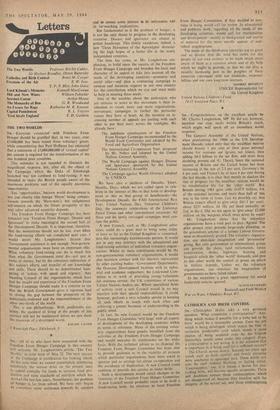A READER, Mr. Patrick Connell. has written to tell me
about an invitation he had recently from Schwerin Research Ltd., asking him to be 'our guest at a tele- vision ' research evening.' It read as follows: 'Since we have taken the liberty of selecting you as part of a specially invited audi- . ence, you will naturally
The 'testing of programmes' involved the
showing of a patently bad American comic item and an excerpt from Elsa the Lioness. For Mr. Connell, in ,fact, it .seemed 'an evening of market research of the most blatant and tedious kind into the efficacy of television commercials.'
Understandably, Mr. Connell wrote to Schwerin Research saying that he resented the Way in which his time had been wasted and protesting at the misleading impression given to him—and, presumably, to many others—by the invitation. In reply, Mr. Connell had what I can most charitably describe as a devious letter of apology, but this was followed by a somewhat more sensible .one from the managing director Who waS prepared to admit that ' . . we obviously did not convey sufficiently clearly to you the estent of the use we make of the questionnaire Particularly in relatiOn to television commercials.' Mr. Connell was invited to a meeting with the managing director to discuss the subject in detail. He thinks that future invitations may, ai a result, be worded more clearly.
If Schwerin and firms like it will take note of
his objections, Mr. Connell will have done him- Self--and us--a service, as there are, in fact, half a -dozen organisations that pre-test TV commer- cials. Some take projectors to people's homes; some ask people to come into a specially fitted-up bus which has a projector and screen inside— and some invite people to a theatre. A recent correspondence in The Times shows that more and more people are being subjected to some kind of research. One correspondent reports that he was a witness to a road accident. 74o insurance companies sent him lengthy questionnaires which he carefully answered—


































 Previous page
Previous page